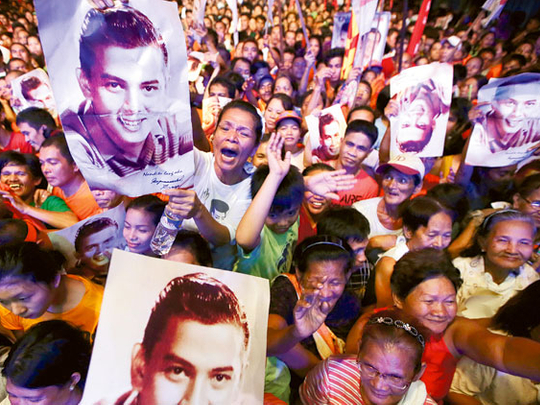
Manila: As the campaign period for the May 13 polls heated up on its last day on Saturday, cab driver Jose Nicolas told Gulf News, “I am not excited to vote. Every three years, I keep hearing the same promises from the same people, who keep breaking their promises every two years. Old and new politicians are alike. They want to remain in power forever. They don’t serve the people.”
He referred to the ruling elite, whose members have been well entrenched in politics. Although dynasty and traditional politicians have become dirty words in this year’s polls, critics were not strong and proactive to allow change of candidates.
In a depressed area near a river in suburban Quezon City, unemployed voters and poor residents have formed groups, like herds, to receive gifts — consisting of money and grocery items — from handlers of candidates. “Vote-buying is both a blessing and a headache for all parties concerned,” said Gemma de la Cruz at East Riverside.
Gift giving from traditional politicians has become systematic and secretive to avoid being reported by more modern and anti-corruption candidates that could lead to disqualifications from the Commission on Elections.
Citing the prevalence of vote buying during elections in the Philippines, Corazon de la Paz-Bernardo, head of the National Citizens’ Movement for Free Elections (Namfrel) said in a letter sent to the Commission on Elections (Comelec) that professional vote buyers now work as if in an auction house, they bid the amount they would pay to corner votes.
Nicolas, the complaining taxi driver who remained reluctant to vote on May 13 did not mention another anathema in Philippine election: candidates are supported by big business. This is not as apparent as vote buying, but its implication can send chill down the spine of a conscious observer.
“Supporters even include drug lords and illegal gambling lords,” a source who requested for anonymity, told Gulf News.
Complaining about political dynasties and monetary support that political families could eschew from big corporations, Randy David, columnist of the Inquirer said, “It is not right that the power to govern is monopolised by a few families, or transferred along kinship lines. It is not right that money from the propertied classes should determine a candidate’s chances of winning.”
At the same time, David also complained of a growing anomaly in Philippine politics: about the popularity of popularity surveys that pave the way for a cynical point of view that winning an elected post is a mere numbers game more than an exercise of voters choosing judiciously candidates based on the latter’s integrity, sense of governance and service for the people.
“It is not right that paying clients (who are also candidates) should determine the agenda and content of scientific studies (of popularity polls),” said David, adding that popularity surveys are now being misused to control voters’ behaviour.
In a more modern and sophisticated society, “political dynasties, religious meddling in politics, corporate financing of electoral campaigns, and the use of surveys to sway voters are bound to become less important, or even obsolete, David, a sociologist, analysed.
He did not mention that the Catholic Church has no monopoly of persuading voters. Right wing rebels, left wing communists, and Muslim rebels in the southern Philippines have powers to persuade voters, but up to now, they are not yet represented in the upper and lower houses of Congress, a sign that various persuasions cannot yet coexist democratically in Philippine politics.
This is a clue as to why Philippine election is always bloody among members of the feudalistic ruling elite who keep biting at each other for electoral posts every three years.
More than 50 people have been killed in 60 elections-related incidents since early this year. The police and the military were scheduled for red alert level on Monday as 50 million voters elect 18,000 positions in Congress and local government units nationwide.
Philippine election is not a walk in the park, and covering it is like covering war, said one journalist.











